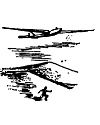|
As they read scientific papers, they ran across an article on Lilienthal's glider experiments in Germany. So they got together all the information they could find about Lilienthal and his work - they investigated Chanute's experinents - and read about Langley. But the Wrights could never be satisfied just reading about these experiments - they had to try things for themselves.  They didn't let the fact that Lilienthal and Pilcher had been
killed - or that Chanute had quit
after a careful study and many experiments in gliding - prevent
them from going ahead. They wanted to fly! The Wright boys - in 1899 -
began with a biplane kite equipped with wing controls. It is
interesting to note that their first man-carrying kite cost them, in
actual cash outlay, about $15.00. As the result of a letter to
Chanute - and Weather Bureau reports - they decided to go to Kitty
Hawk, North Carolina, for their first experiments.
They didn't let the fact that Lilienthal and Pilcher had been
killed - or that Chanute had quit
after a careful study and many experiments in gliding - prevent
them from going ahead. They wanted to fly! The Wright boys - in 1899 -
began with a biplane kite equipped with wing controls. It is
interesting to note that their first man-carrying kite cost them, in
actual cash outlay, about $15.00. As the result of a letter to
Chanute - and Weather Bureau reports - they decided to go to Kitty
Hawk, North Carolina, for their first experiments.You probably know the story from then on - how they made glider after glider - how they fought the weather - about their accidents and their inaccurate data. During the next two years, they visited Kitty Hawk with new wings, new controls - and collected fact after fact - until in 1902 they felt they had enough information to build a power machine. Then began another long year's experiments on engines; they found there was none in existance that met their requirements. |








